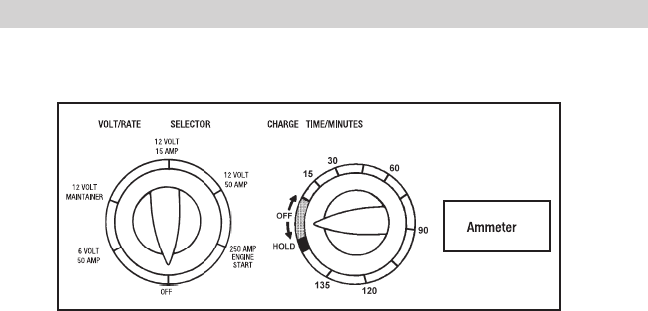
• 11 •
OPERATING INSTRUCTIONS11.
Follow steps in section 6 or 7 for hookup and disconnect instructions, and 11.1
precautions.
SETTING THE CONTROLS
All controls for your charger are located on the front of the unit. Follow
these instructions to obtain the accurate charge level for your battery.
TIMER11.2 : The main function of the timer is to prevent over charging while al-
lowing the battery time to obtain a satisfactory charge. To properly set the
timer, you must know the size of the battery in ampere hours or reserve
capacity in minutes, and the state of charge. Often, the state of charge
is not known, which is why the timer is limited to 2.25 hours. With the aid
of a battery load tester, the state of charge can be obtained within a few
seconds. For example, the average size automotive battery at a 50%
state of charge, will require 1 to 1.5 hours of charging at the 50 amp rate
to reach the full charge state. For the same battery with the timer set to its
maximum of 2.25 hours, over charging will occur, but is unlikely to cause
harm to the battery. When the charge state is unknown, start out with a
timer setting of 1 hour or less.
HOLD:11.3 This function allows continuous operation. Use when charging for
more than 2.25 hours (usually when the 2 amp charge rate is selected).
Stop charging when the battery is fully charged.
Rotary switch:11.4 Use the rotary switch to select the charge rate or engine
start setting required.
Ammeter:11.5 Indicates the amount of current measured in amperes that is
being drawn by the battery. For example, in the 50 amp charge rate, a
typical discharged battery will initially draw approximately 50 amps. As
the battery continues to charge, current will taper to 15 to 20 amps at full
charge. The Start area of the meter indicates a high rate of current be-
ing drawn from the charger. When cranking an engine, the starter motor
draws upwards to 250-300 amps. The meter needle will be at the extreme
right side of the start area. Sometimes, for the rst few minutes of its
charge, the battery will draw more than 50 amps; in this case, the needle
may be within, but not all the way over, to the right side of the start area.
The 2 amp charge rate may not indicate activity on the meter. The meter
does not have the resolution to display this low rate.


















